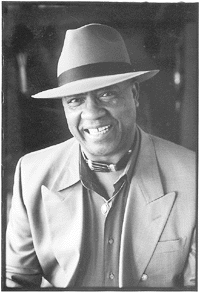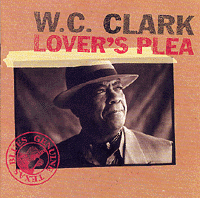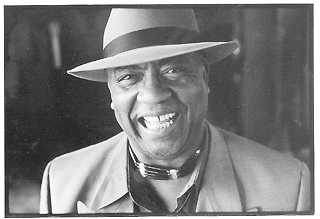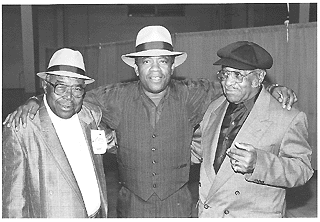Confessin' the Blues
Soul Man W.C. Clark
By Christopher Hess, Fri., July 31, 1998
- Martin Banks, Blues Family Tree Video (1991)
"[Blues music] was (and is) the lament, the comment, often mocking or ironic, of the solitary individual, bereft of the support of tribe or close-knit society, facing alone, on personal terms, a hostile or indifferent world."
- Daniel Kingman, American Music: A Panorama
|
photograph by John Carrico |
The blues, as a musical tradition and cultural institution, is all of these things. More than anything else, however, the blues is about resilience. That the lone cries of slaves in chains survived to bloom into what we know as the blues is an amazing feat of individual and collective fortitude. Whether it's Cassandra Wilson or Koko Taylor pouring out the song on stage, the blues singer is an embodiment of strength, one who survived the torments of which she sings. And when B.B. King or Buddy Guy sings the blues with his voice and his guitar, he's the man who has survived the pain of living. The song is proof.
"I remember, I got a whippin' one day," recalls Austin bluesman, soulman W.C. Clark. "I stood up and said to my mother and stepfather that I wasn't gonna work all my damn life.
"`What's that boy? What you say?'
"`I ain't gonna work all my damn life.'
"I was probably pulling corn or cotton or some kind of stuff like that, but I knew then that I wanted to be a musician. I love the feeling of it, the sound - and most of all those guys don't have to work hard."
Wesley Curley Clark was born in Austin, at Brackenridge Hospital in 1939, and was raised in north Austin in the St. John's area, living with his grandmother as a child and later with his mother and stepfather. With the exception of brief, job-oriented stints in other cities, he has lived here all his life, all but seven years of which has been spent with a guitar in his hand.
He has lived these years as a musician, true to the dream of his childhood, and for the most part, it has been a happy, fulfilled life, his blues formed more from artistry than suffering, cultural connection more than individual turmoil. That was until about a year ago, when a highway accident spared Clark's life, but claimed those of his fiancée Brenda Jasek and drummer Pete Alcoser Jr.
Up to that point, the blues had simply been Clark's life-long vocation.
"When I was about 12, a gospel quartet wanted me to play guitar with them," remembers Clark. "I wasn't real good at guitar; I'd learned a few chords and could play a few country-western songs, a few gospel songs. That was my learning point right there."
Clark's mother and grandmother were both singers, active in the church, and gospel music filled his home and his head as he grew up. In this religious family, gospel reigned. More popular forms were not as worthwhile or accepted.
"Blues wasn't forbidden," explains Clark, "but you had to give most respect to the gospel."
The blues came soon enough.
"When I was 13, I could go out and play," he says. "The Skyline Club used to be on the north end of Austin, on North Lamar. I could walk in there with my guitar and just start playing, and somebody would throw money to me - that's when people used to throw money on the floor to you. If I wanted some money, I'd pick up my guitar and start playing. If they wouldn't let me in, I'd sit on the sidewalk. People would give me money there, too."
|
|
Clark had a cousin named Big Pete Pierson, an established blues guitarist. When the road called Pierson away from his regular gig with T.D. Bell and the Cadillacs, the 16-year-old Clark stepped in and held down the job. This experience, plus playing with folks like "Guitar" Herbert and Erbie Bowser in various Eastside venues, enabled Clark to land a regular job with Blues Boy Hubbard and the Jets at Charlie's Playhouse, where they played a gutbucket mixture of blues and R&B - soul music.
"We were the house band, we worked in tuxedos," recalls Clark. "I was there five or six years, and I learned a lot of discipline - meaningful things I still use in my performances today. They made me professional."
Learning the manners of a professional musician wasn't easy at first for Clark the young upstart, but he soon learned the value of formal training.
"I have to admit, back then I rebelled against what they did 'cause I thought it was stupid. I just wanted to play music, but they were talking about appearance, stage stuff, you know. I used to fight against that, but now I'm thankful for it 'cause you'll never see me on stage drinking beer or talking loud, wasting time between songs. Back then, Ivy Gilden of Charlie's Playhouse, if she saw us taking too much time between songs she had a flashlight and would shine it at us on stage. I used to get upset about it, but I'm glad she did those things.
"That was the time that the University of Texas kids was turning Austin into a mixed crowd. Charlie's Playhouse was a focal point for the blues. ... That's where [white] guitar players like Bill Campbell came from, that scene. Then after Bill came Jimmie Vaughan. Bill Campbell was involved at Charlie's, he used to come up there and step upside Freddie King, Albert Collins, and play."
The desegregation of the Austin blues scene would have a big impact on Clark's career. It began the gradual, but near-complete dissolution of East Austin blues clubs and the tight-knit scene that went with them. This sent Clark on the road with Houston R&B pioneer Joe Tex, whose steady working of the Southern "chitlin' circuit" (black clubs) gave the young Austin guitarist a first-hand view of serious, down-home talent. On a return visit from a short stint in New York during the mid-Seventies, Jimmie Vaughan's band Storm needed a bass player to fill in for a gig. Clark obliged.
"I thought the blues scene in Austin was dying out, but it was slowly coming back then," says Clark. "Jimmie, Bill Campbell, Angela Strehli, Denny Freeman, Paul Ray. The Eastside was dying out. This was a time when all of a sudden the blacks started moving up, getting better jobs, better homes, two cars in the driveway. ...
"When I first met Angela, she was singing with James Polk & the Brothers. She was the only white singer. John Reed was playing guitar. I had never seen a band like that - a mixed band. I wanted to be involved with that, so I worked with James Polk for a while, then we decided to form our own group - me and Angela, Denny Freeman, and Derek O'Brien. That's when we formed Southern Feeling."
Southern Feeling enjoyed some success locally and some notice outside Austin at the waning of the Seventies, playing and recording on the West Coast between San Francisco and Seattle. When the band broke up, Clark returned to his constant and reliable job as an auto mechanic.
"I had always been a mechanic," he says matter-of-factly. "My daddy was a mechanic. He owned his own garage."
It was at this point in time that Clark became reacquainted with an old friend, Stevie Ray Vaughan.
 "I had met Stevie long before that - he had been coming around sitting in with us in Southern Feeling," says Clark. "At that time, he was playing with the Cobras with Paul Ray. They busted up and Stevie was on his own for a while. He used to come down [to the garage] and see me all the time. He wanted to put together a band. He was young and he knew what he wanted to do, but he didn't have all the tools to do it with. I had amplifiers, guitars...
"I had met Stevie long before that - he had been coming around sitting in with us in Southern Feeling," says Clark. "At that time, he was playing with the Cobras with Paul Ray. They busted up and Stevie was on his own for a while. He used to come down [to the garage] and see me all the time. He wanted to put together a band. He was young and he knew what he wanted to do, but he didn't have all the tools to do it with. I had amplifiers, guitars...
"Finally, he talked me into it, and me, Stevie, and Mike Kindred started playing. Stevie was an amazing guitar player already, long before that."
In 1980, the three friends formed Triple Threat, so named because all three musicians were experienced bandleaders by this time. Clark took the role of bass player.
"I still say today I'm a bass player," laughs Clark. I'm still learning guitar. I could pick up a bass and play anything any time I want to."
Learning to play bass came to Clark out of necessity. At that time, musicians learned more than just their own particular part of a song. They learned what the drummer was doing and what the bass was doing - often by voice, since many bands used vocals as a substitute for a stringed-bass.
"That way, if the bass player didn't show up, I could trade over and make the gig. That was the thing: Make the gig, baby, make the gig. ...
"I got a lot of things I could say about some of the younger players today. It would have something to do with the old school and the laws that used to be respected that are not truly respected anymore. Some musicians start off right in the middle of something and they're not interested in the past. Then there are musicians interested all the way - from the beginning all the way up. You see it in people like Jimmie, Stevie. ... They studied the beginnings of blues and jazz and that sort of thing.
"What I'm talking about is musicians who don't have enough respect for the blues to want to learn it correctly. Every musician has a right and a space within the music to do their own thing, but their own thing has to be done in that particular category - bass category or drums or whatever. When it isn't, they start stepping on other parts.
"Blues is everything in its place and a place for everything. As long as it's like that, you're within those laws. They're not rules like you go to jail if you break them. They're moral laws that have a lot to do with respect for the next play in order to create the unity you need to play with each other and have a smile on your face when everything's over.
"That's why I'm thankful to those people at Charlie's Playhouse. They made me understand. They put me on the right road, and I'm the finished product of that. I knew I had to communicate, and I couldn't communicate by doing everything my way. I had to go by the rules."
Triple Threat came to its inevitable conclusion some two years after it had come to be, each of its leaders needing creative control. They saw this coming, according to Clark, so they started pushing Stevie to the front. At that point, Triple Threat morphed into Double Trouble, with Clark leaving to form his W.C. Clark Blues Revue. He's been there ever since.
In 1987, Clark self-released his first recording, Something for Everybody, which led to his being signed to blues indie Black Top Records and releasing his debut for them, Heart of Gold, in 1994. He followed that with Texas Soul in '96 and this year's Lover's Plea, both on Black Top, the latest (as well as a re-pressing of Texas Soul) slated for distribution and promotion by Alligator Records.
Though he has yet to receive the attention that the quality of these recordings seems to merit, Clark's mix of Texas blues and Chicago guitar flair with lyrics that hearken to Memphis soul has a broad appeal that wider distribution of Lover's Plea should expose to a larger audience. After all, if blues is sufferin' music, then there is no doubt as to why his latest effort is so inspired: Clark's slow and steady climb upward was interrupted March 9, 1997, by a catastrophe that turned this ascent into a tailspin.
"We were on our way back into town from our tour," says Clark. "We had our last engagement in Milwaukee. Three of my guys made different arrangements, and it was only me and the drummer and my fiancée, who was there for that tour on vacation. I was driving, and my body just gave up on me. They ruled that I went to sleep, but it was more than that. It wasn't like I went to sleep. It was like I was looking at the highway one second and the next second my body was falling out.
"I think it's a good possibility that I had a seizure. That's my own personal thought. I just know how I was feeling. There have been times I'm sitting there talking to someone and the feeling will come over me and hit me and then it goes right away."

Clark, animated, relates this story quickly, as if he wants nothing left out, hoping to finish the telling and the reliving that goes with it as soon as possible.
"Whatever happened, it happened like that," he says, snapping his fingers. "I was looking at the highway and the next thing I know, I'm watching the steering wheel turn and my body going down."
Clark leans his body as if following the motion of a steering wheel turning right. According to Clark, he slid off the seat towards the gap between the two front seats.
"It wasn't really late; it was somewhere around 11pm. We were coming through Sherman, Texas on 75 coming into Dallas. And ... the van was totally demolished, I was the only survivor."
That W.C. Clark has released an album and stepped into a lengthy tour a year after the accident turned his life upside down is a testament to his resilience - a testament to the resiliency of a bluesman. The blues can define, explore, and treat pain like no other music can. That Clark consistently performs with no loss to his skill is beyond resilient - it's inspiring.
"My left arm is messed up," he says. "It's not like it used to be. This whole muscle on top of my shoulder is right here in a big ball."
He touches the front of his shoulder, the fore-section of the ball and socket.
"All the cartilage is busted there. I've been to the doctor, but I haven't had anything done to it, because I want to play music. And look at it. If a doctor sees this, I'll be out of playing for a while. And I don't know, it might be forever. So, it falls out of place and it hurts when I do certain things. That's one reason I sit down and play these days, so I can rest my arm on my leg and play the guitar like this."
He props his left arm on top of his left thigh, leaning into it to shorten the reach needed by his left hand. Clark goes on to demonstrate the procedure for putting his arm back in the socket - a painful-looking maneuver where he pulls his left arm by the wrist with his right hand until it's straight out in front of him, yanking it up and back, and forward again, seemingly settling the slumped muscle back into its natural spot on top of the shoulder.
Clark is dealing with the mental aspects of the accident in a different way.
"Some of my fans come to me and say things like, `I really admire you, man, 'cause I'm either suffering from the same thing or I have suffered from the same thing. You sure are taking it strong.'
"But I'm not. Every time I play, I have to turn myself into a character anyway. I just hide behind that character."
To explain this character, Clark straightens up a bit and pulls down on his trademark Fedora until the brim crosses the plane of his eyes. He looks out from under its brim.
"There it is," he says. "Right there. I pull that hat down, feel it on my head, see that brim, and I automatically turn into a character. From the time I walk in the door, the feeling hits me right there. I can be tired, have a headache, anything. From the time I walk in the door my body is automatically there. If I don't have my hat on, I can't create that character. The audience won't know that, but I'll know it.
"Everybody thinks I'm having a good time and everything, but this stuff is on my mind all day long. Sometimes I start focusing on it to the point where I try to figure out how, why, what happened? Then after a while, I have to remind myself that I'm questioning in an area I can't answer. And I have to come out of there, shake my head, and think of something else as much as possible. I'm a highly religious person. Everything about that situation was in God's hands, and still is. I mean I can't even begin to understand how I survived other than by God himself."
Lover's Plea is not a sad album. It's a blues album. "Are You Here, Are You There?" is a hauntingly searching song Clark wrote for his fiancée after the accident. It's the only song that refers directly and exclusively to what happened that night on the highway. Elsewhere on the album, Clark sings of the joys of watching his daughter grow up ("Pretty Little Mama"); of personal betterment through the salvation of a good love ("Changing My Life With Your Love"); and of his mother ("Why I Got the Blues"). It's an account of a survivor turning his attention from that which he survived back to life. This just happens to be a life of the blues.










